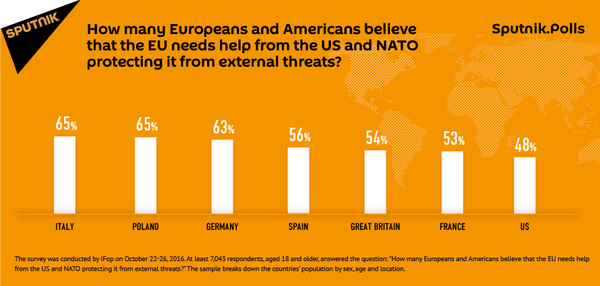Participants in the poll recently conducted by Ifop were asked a single question: “Is the EU capable of defending itself against external threats or does the union require the aid of the US and NATO to ensure its own safety?”

Over half of the Europeans polled believe that the EU does need the protection offered by the US and NATO, while only 48 percent of American respondents share their opinion on the matter.
The idea that Europe needs the US and NATO aid turned out to be especially prevalent in Germany (63 percent) as well as Italy and Poland (65 percent).
Meanwhile, the concept that Europe doesn’t require any external assistance to ensure its safety appears to be most popular in France (30 percent), Spain (33 percent) and in the US (31 percent).
It should be noted that the idea of Europe being capable of fending for itself is especially popular among younger people (respondents younger than 50 years old), with the exception of Spain, where the adherents of this belief are mostly younger than 35. This concept is also primarily supported by people with a higher education (except for Poland, where the exact opposite is true) and those with an above-average income and social standing (once again, except for Poland).
Also worthy of note is that this idea is professed by 40 percent of the French far-left parties’ supporters, along with 43 and 36 percent of their Spanish and British counterparts, respectively.
The survey was conducted by Ifop, the oldest public opinion polling company in France, from October 22 to October 26, 2016. A total of 7,043 people were polled. The data selection represents the population by gender, age and location. The margin of error for the data per country is +/- 3.1% at a confidence level of 95%.



